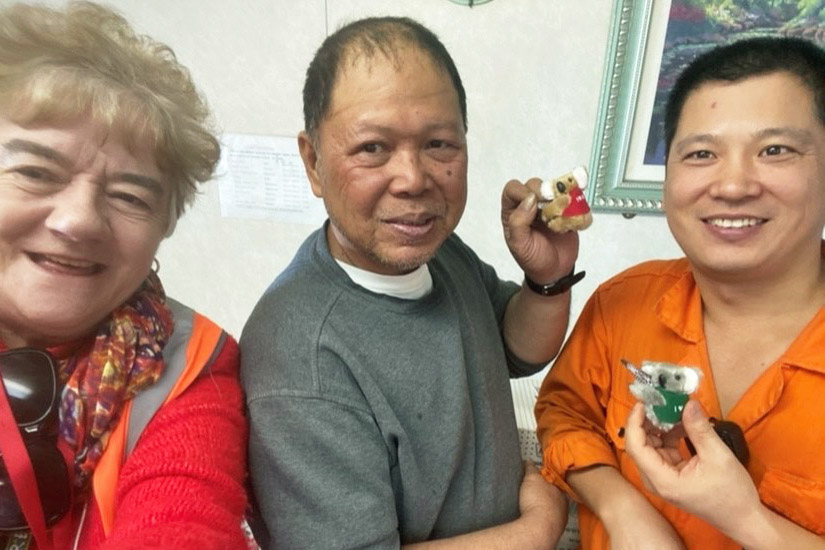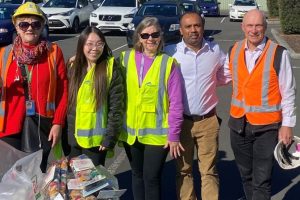
To commemorate Sea Sunday 2024 on Sunday 21 July and Sunday 28 July, we reshare an article (first published in Tui Motu Magazine) written by Sr Mary Leahy, a Sister of Saint Joseph and Chaplain to Seafarers in Sydney.
Sr Mary writes of the exploitation of seafarers in the global shipping industry and the support needed to keep them safe.
Seafarers — Our Unsung Heroes
Seafarers Are Essential Workers
Despite these slogans and many others depicting the critical role that seafarers play in facilitating 98% of global trade, this group of workers is generally invisible to us and receives scant attention from society.
For a brief time, the Covid pandemic shone a light on seafarers as essential workers, but it also lit up the deplorable suffering many endured on their vessels. One example was when Covid broke out on the cruise ship Ruby Princess in 2020 and it returned to dock in Sydney harbour. The media focus was on the passengers, but the crew were equally affected. Passengers were permitted to disembark while the crew remained onboard. This resulted in the spread of the virus onshore and at least 20 deaths. The later inquiry said that “the risk of asymptomatic and pre-symptomatic spread of the disease warranted that all passengers and crew be placed in quarantine, not just the symptomatic passengers and crew”.
Confined at Sea
The risk of the spread of the virus on ships was high and to mitigate the danger crews were confined to their vessels. Seafarers were physically and emotionally vulnerable because they were trapped on their vessels for months — some longer than 14 months — because of border closures. This meant that, like the rest of us onshore, seafarers were unable to be with their families for significant events like the funerals of their loved ones for over a year. Some were unable to contact their families for months on end.
I met Bobby* a cook on a fuel tanker vessel one afternoon. He told me that while he was preparing the crew’s lunch that morning, he was also organising the cremation of his wife who had died of Covid at home in the Philippines. His children were little, too young to manage on their own and all his other relatives were in lockdown. The funeral and family arrangements were all on his shoulders. It was critical for Bobby to get home to his children. After intense advocacy by our chaplaincy and other seafarer welfare people, he was granted permission to leave his ship in Australia and fly to the Philippines. He had a woeful journey: he spent 14 days in quarantine in Sydney, 14 days quarantine in Manila and a further 14 days in Cebu, before he finally reached his bereft children.
Bobby’s is just one of many stories of seafarers suffering at that time. In those years we heard of mental stress, fatigue and suicide wreaking havoc among seafarers. And all the time ships continued to come and go on almost normal schedules delivering goods to our shores — stocking our shops and homes, bringing essential commodities like fuel and pharmaceutical items. Yet, despite their work being essential to the country, our authorities dragged the chain on the vaccination of seafarers. It was through the constant lobbying of Seafarer Welfare groups, unions and individuals that crews were eventually vaccinated in our region. That decision came months after the introduction of vaccination programmes for seafarers in the USA. Resulting from their experiences during the pandemic, some seafarers gave up their seagoing careers and looked for land-based work.
Dangers in Work
Post-pandemic, many seafarers are still facing accidents and abuse, dangerous working conditions, wage theft and piracy. A research project initiated by the International Transport Workers Federation (ITF) estimated in the report Robbed at Sea (2022) wage theft from seafarers in Australian waters by shipowners and agents of $65 million a year. The Nowhere to Hide Campaign (2024) recovered $38 million of these stolen wages, but wage theft is an ongoing issue in the shipping industry. Seafarers are in danger and killed in war-torn areas. In March this year three seafarers, two Filipino and one Vietnamese, died and others were injured as a result of Houthi attacks in the Gulf of Aden. And 25 seafarers are being held hostage by Houthis who seized their vessel, the Galaxy Leader, in the Red Sea in February. The workers are suffering and mostly abandoned by the companies that employed them. We know of seafarers and their ships being abandoned at alarming rates in Dubai and other ports. The workers cannot return home unless some authority rescues them.
More Training Needed
Ships are required to reach zero emissions in the near future so there are plans to change from heavy fuels to ammonia, hydrogen and others. These fuels pose significant danger if not handled correctly and already seafarers have grave concerns that they will not get the training they need to handle these fuels safely.
Christian groups are raising our awareness and making an impact in areas such as anti-slavery and social justice within our region. They have highlighted slavery in the supply chains of the commodities we buy and are urging us to support ethical sourcing and to attend to modern slavery indicators. I would like them to include unjust labour issues in the maritime/shipping industry in their work. This would support the few chaplains and welfare workers who are at the coalface of the ministry to seafarers and have limited resources, time and expertise.
Chaplains, welfare and pastoral care agents for seafarers need to have ongoing training and skill development to minister effectively with an international, multicultural, multi-religious and transient community. To be able to access vessels and terminals depends on us being able to work collaboratively with a range of maritime and union groups.
 Friendship and Solidarity
Friendship and Solidarity
I’ve found the resilience of merchant seafarers a constant source of inspiration. The friendships seafarers develop onboard a vessel are deep and carry them through major upheavals. Their total reliance on one another for long periods of time is a constant. It is therefore critical that any intervention by outside sources such as chaplains or welfare and pastoral agents must acknowledge and support the care and solidarity among crew members.
Ships visiting ports in Australia and New Zealand have some oversight thanks to our Maritime Safety Regulator groups and Maritime Union/ITF commitments. But shipping is a global industry — in many regions abuse of seafarers is uncontested and seafarers toil on Flag of Convenience-registered ships out in international waters. Seafarers on these vessels usually come from low wage developing countries with limited power to resist exploitation by unethical ship owners, contractors and sub-contractors.
The social justice saying applies: “We must act locally but think globally”. Just as we’re grateful for the goods delivered by shipping, we need to acknowledge those who crew the ships and ensure that they have fair pay, safe and just working conditions and are appreciated for themselves and their service.
Let me leave you with an Irish toast, one that seafarers appreciate hearing:
and wood ships,
ships that sail the sea,
but the best ships
are friendships
and may they always be!
Sr Mary Leahy
First Published in Tui Motu Magazine. Issue 293 June 2024. Used with permission.
* named changed for privacy
